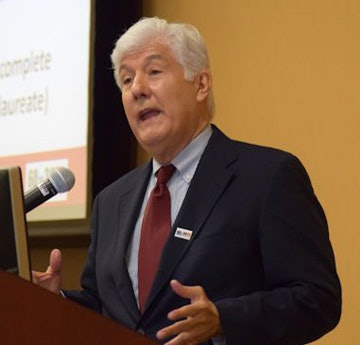The Texas Legislature approved a bill on Monday that would allow more community colleges in the state to offer four-year degree programs.
“We think that that will provide a pathway for some of the poorest students in the state to achieve baccalaureate degrees,” commissioner of the Texas Higher Education Coordinating Board (THECB) Dr. Raymund A. Paredes said in a call with the press on Tuesday.
 Dr. Raymund A. Paredes
Dr. Raymund A. ParedesThree community colleges in the state already offer four-year degree programs. Midland College, South Texas College and Brazosport College have been offering baccalaureate degree programs since 2003. The success of these programs helped precipitate the Texas Legislature’s decision to pass the bill, Paredes said.
Although those three schools are authorized to offer up to five bachelor’s programs, none have hit that upper limit so far. South Texas offers four baccalaureate programs, Midland offers one, and Brazosport recently proposed a second degree.
“That shows that in fourteen years, none of the three institutions have reached their maximum allotment of programs,” Paredes said. “We think that indicates that community colleges understand that it is difficult to mount these programs. It indicates that community colleges want to stick to their core mission of associate’s degrees and certificates.”
All of this, Paredes said, is a good sign, since it shows that community colleges are unlikely to rush to offer four-year degrees. The current bill is designed to ensure that four-year degree programs at community colleges will not compete with similar academic programs at public universities in the state.
So far, 10 community colleges have indicated interest in submitting proposals that would allow them to develop a four-year degree program.
Opening up space for community colleges to offer four-year degrees stands to impact the state’s minority student population. Texas has the second largest Latino population in the nation behind California, and Latinos make up the largest percentage of minority students attending community colleges.
Facing a budget crunch, the legislature was considering budget cuts across the spectrum of public colleges and universities earlier this year. By and large, public higher education in the state evaded those sorts of cuts, Paredes said on Tuesday, and community colleges even made gains in certain performance-based allocations from the state.
In addition, the legislature was eying a bill that would have frozen tuition for the next two years and capped its growth in subsequent years. Although the bill did not pass, it signals broader concerns in the state about balancing affordability and institutional revenue.
“I think that there is a lot of concern in the legislature that we’re reaching the breaking point in terms of maintaining accessibility to higher education, particularly at universities,” Paredes said.
That makes baccalaureate degrees at the community college level particularly valuable, particularly because they can be delivered at about half of the cost of a traditional baccalaureate.
“I think the [legislature’s] going to watch how much expansion we have of these kinds of programs in order to determine what might happen next session,” Paredes said.
Staff writer Catherine Morris can be reached at [email protected].


![Mentor Mentee [60287]](https://img.diverseeducation.com/files/base/diverse/all/image/2024/04/Mentor_mentee__60287_.662959db8fddb.png?auto=format%2Ccompress&fit=crop&h=100&q=70&w=100)


















